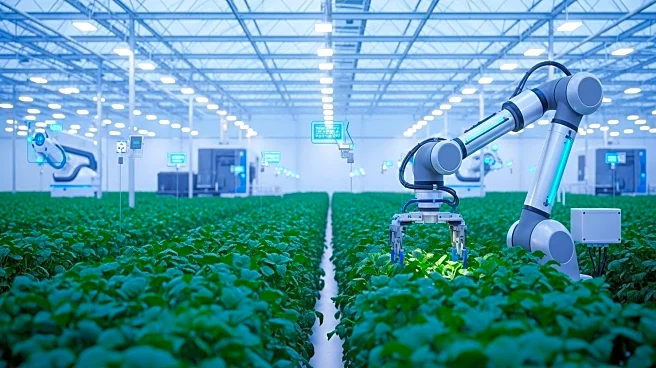What's Happening?
India's agricultural sector is facing significant challenges due to new US tariffs imposed by President Trump, which have doubled to 50% on Indian imports as of August 27, with potential increases to 100%. These tariffs affect key export categories such as marine products, Basmati rice, spices, fresh fruits, and vegetable oils, which collectively amounted to $5.7 billion in exports to the US in the fiscal year 2023-24. The Indian Ministry of Agriculture and Farmers' Welfare, led by Shivraj Singh Chouhan, has indicated that these tariffs make exports unprofitable, prompting farmers to explore alternative markets like Russia and China. Amidst this trade disruption, there is a growing interest in agtech solutions to reduce input costs and improve yields, potentially accelerating technology adoption in India's agricultural sector.
Why It's Important?
The imposition of US tariffs on Indian agricultural exports is significant as it pressures the sector to innovate and adopt technology to remain competitive. India's agriculture accounts for 18.2% of GDP and employs 46% of the workforce, making it a critical component of the economy. The tariffs could delay India's projected economic growth, but they also present an opportunity for agtech investment. Companies like Syngenta and Bayer are investing heavily in India, seeing technology deployment as essential for capturing market share. The push for modernization is driven by challenges such as climate change, resource constraints, and the need for increased productivity and sustainability.
What's Next?
As India navigates the impact of US tariffs, the focus will likely shift towards enhancing agtech adoption to mitigate trade volatility. The Indian government is promoting climate-smart farming, which could accelerate technology deployment despite trade headwinds. Global agribusinesses are expected to continue investing in India, targeting specific value chains and crop protection solutions. The country's policy environment and demand for modern agronomic practices may further drive innovation adoption, positioning India as a key agtech market in the coming decade.
Beyond the Headlines
The broader implications of this development include potential shifts in global agricultural supply chains and increased emphasis on sustainable farming practices. As India adapts to trade pressures, the integration of technology could lead to long-term improvements in productivity and environmental sustainability. This transformation may also influence global agribusiness strategies, as companies seek to leverage India's scale and growth trajectory.








